#Late Republican Age
Text
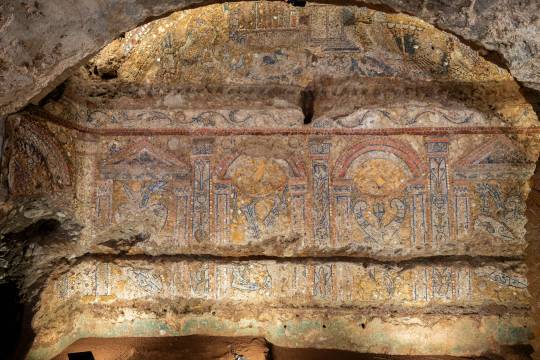

‘Incredible’ Mosaics Were Found in an Ancient Luxury Home in Rome
Italy’s Culture Minister Gennaro Sangiuliano has called the works “an authentic treasure.”
Researchers working in the Archaeological Park of the Colosseum in Rome have shared their discovery of luxurious mosaic-tiled rooms found in an ancient home on the site, which they believe may have belonged to a Roman senator. Created from shells, glass, white marble, and Egyptian blue tiles, the mosaics have been described by Italy’s Culture Minister Gennaro Sangiuliano as “an authentic treasure”.
The “rustic” mosaics, found on the grounds surrounding the Colosseum in the heart of the city, date to the late Republican Age, in the last decades of the second century B.C.E., and show a series of figurative scenes. They once decorated a townhouse, or domus, owned by an upper class citizen. Italy’s Ministry of Culture have said that “due to the complexity of the scenes depicted” and their age, the mosaics are “without comparison.”
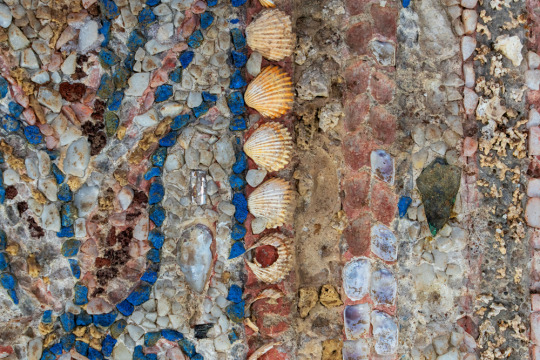

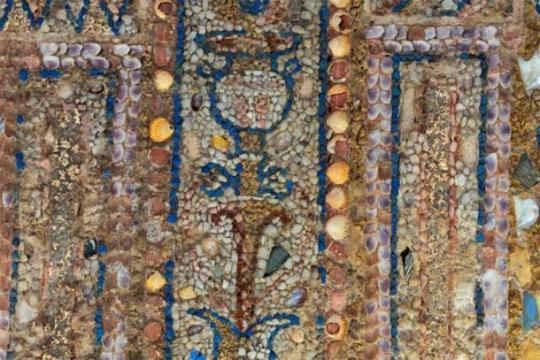
One mosaic depicts a coastal city with towers and porticos, with three large ships floating by on the ocean waves. The culture ministry believes this could be a reference to naval victories achieved by the owner of the home, which is believed to have been a Roman senator. This is supported by historical sources describing the area as having been occupied by such high-ranking members of society.
The decorated walls were likely located in the home’s dining rooms, where luxurious banquets would be hosted, and guests at these events were likely wowed with “spectacular water games,” according to the culture ministry, based on the presence of lead pipes set into the walls.
In the reception room, an extremely well preserved decorated stucco featuring landscapes and figures was also discovered. Other designs include vines and lotus leaves flowing from vases, musical instruments, and tridents.



The mosaic walls were first discovered near the Colosseum in 2018, but excavation at the site will continue into 2024, and more rooms could be discovered. Alfonsina Russo, the Director of the Archaeological Park of the Colosseum, has said that once the domus is full uncovered, “we will work intensely to make this place, among the most evocative of ancient Rome, accessible to the public as soon as possible.”
By Verity Babbs.
#‘Incredible’ Mosaics Were Found in an Ancient Luxury Home in Rome#Archaeological Park of the Colosseum#Late Republican Age#second century B.C.E.#mosaic#roman mosaic#ancient artifacts#archeology#archeolgst#history#history news#ancient history#ancient culture#ancient civilizations#ancient rome#roman history#roman empire#roman art
1K notes
·
View notes
Text
grieving not for the loss of my rome special interest (that’s not even true she is not going anywhere ever) but celebrating because of my expanded interests.
#like the religious history of the middle ages is sooooo interesting omg and the renaissance is as close to late republican rome#in the way of petty politics that you’ll ever get so it’s like. it’s very compelling to ME#samael speaks
3 notes
·
View notes
Text
i am GOING to regret engaging in that but what's done is done.
#we'll blame the late middle age republican men pretending to be democrats who hate joe biden#i can clock 'em from a mile away#fake fake fake
0 notes
Note
Hi my friend wanted to ask about Chinese Opera and the red pom poms on their hats and their significance. I asked my mom and she said they were for decoration so I just wanted clarification
Hi! Thanks for the question, and sorry for taking ages to reply!
The pom poms you see on 盔头/kuitou (Chinese opera headdresses) are called 绒球/rongqiu (lit. "velvet ball"). They are often red, but can also be other colors, and vary in size. Ronqiu are decorative and serve to distinguish the many different types of kuitou from one another. Each type of kuitou is distinct in the number, size, and color of rongqiu that it's decorated with (of course, not all kuitou have rongqiu).
Below - a few different types of Beijing opera kuitou decorated with rongqiu (x):
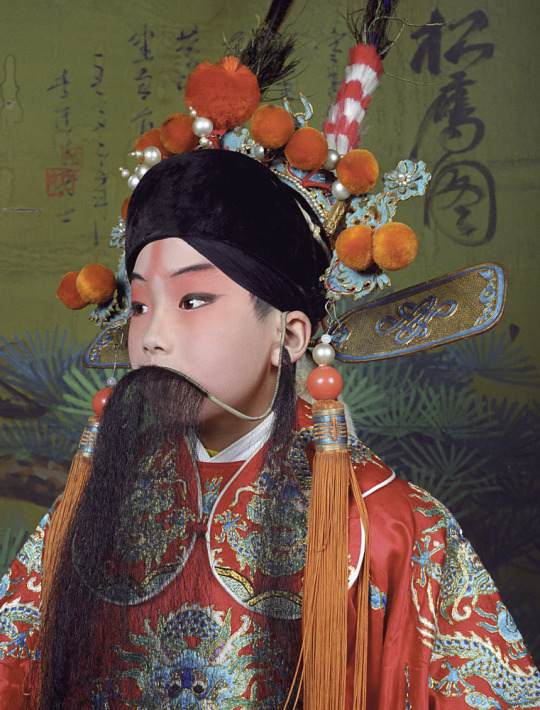
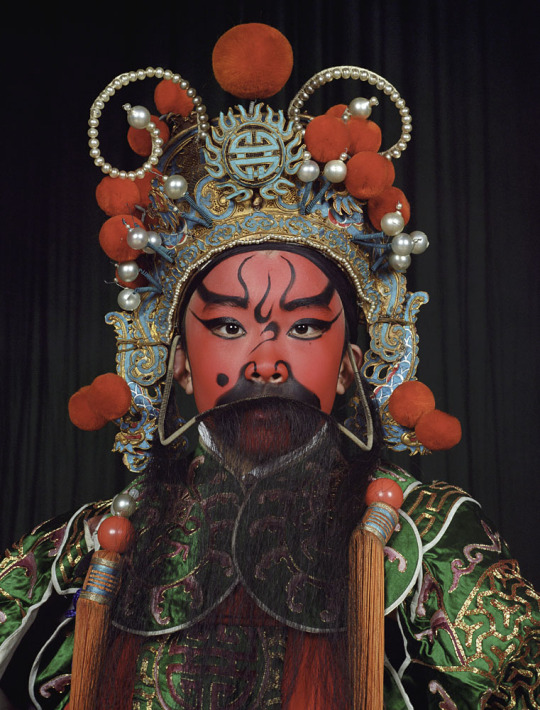
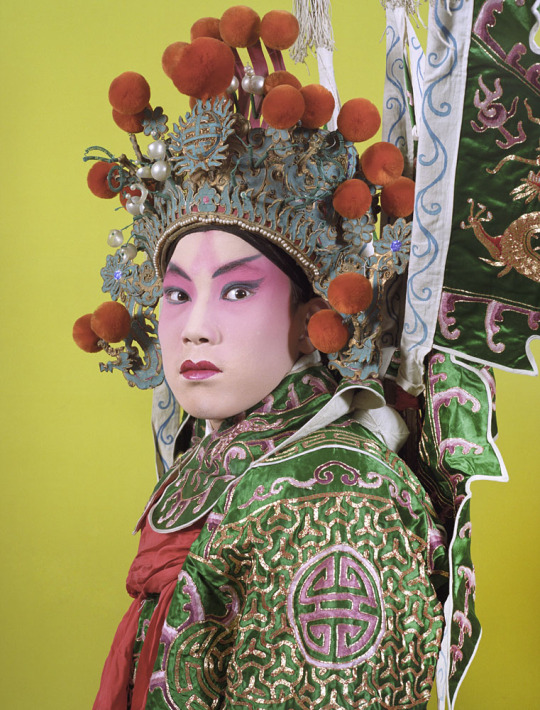
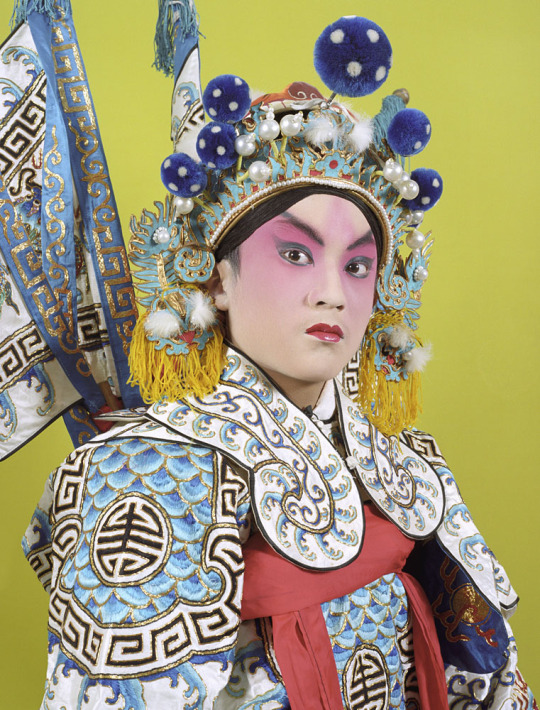
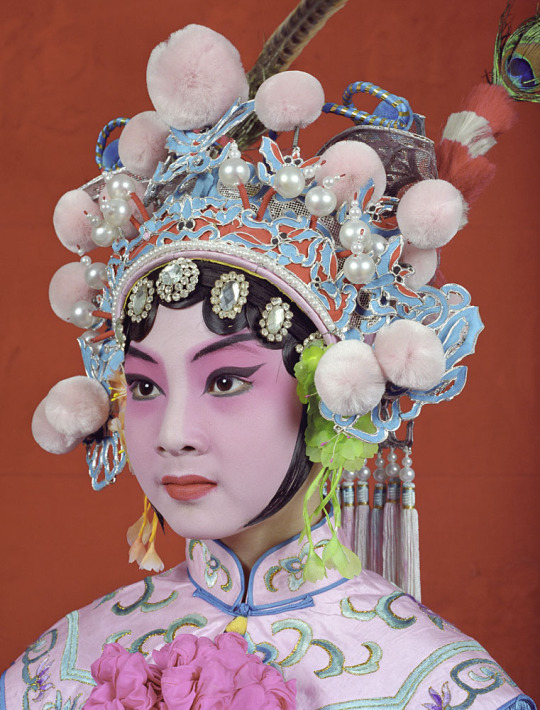
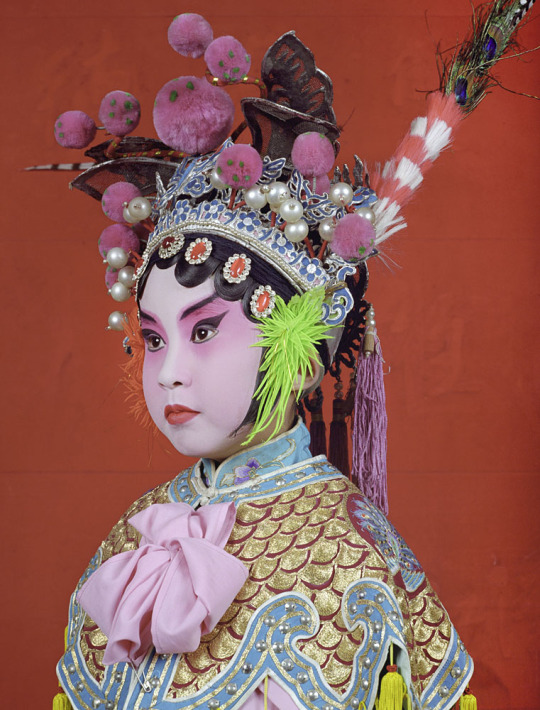
Rongqiu isn't used just for Chinese opera performances - it's a very common decorative item for Chinese headwear, especially for traditional/folk performances.
Below - examples of rongqiu use in folk custom/performance costumes, left to right: 1) 游神/youshen (wandering gods) procession in Fujian (x), 2) 英歌舞/yingge wu (yingge dance) performer in Guangdong (x), 3) & 4) 高跷/gaoqiao (stilt walking) performers in a 社火/shehuo parade in Gansu (x):

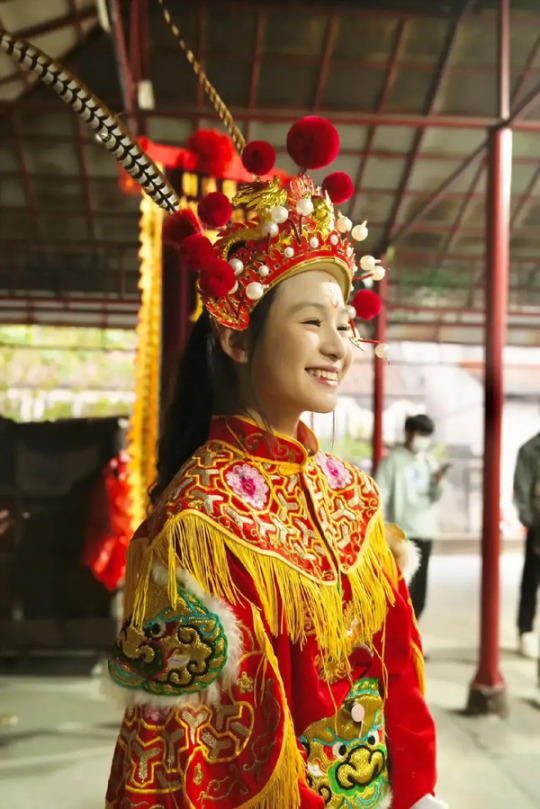

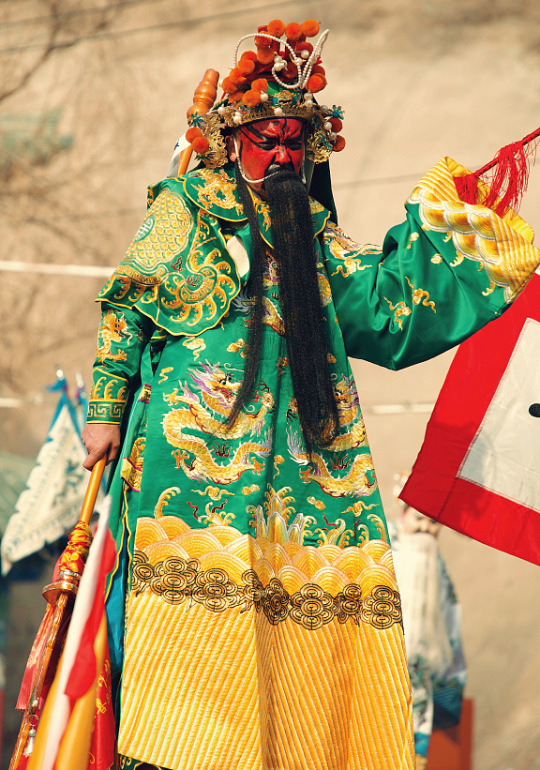
As a festive decoration, rongqiu was also widely used on bridal guan (crowns) from the Qing dynasty into the modern day.
Below - examples of rongqiu use in historical bridal guan: Left - a bride during the late Qing dynasty, circa 1890 (x); Right - a bride during the Republican era/minguo, in 1939 (x):
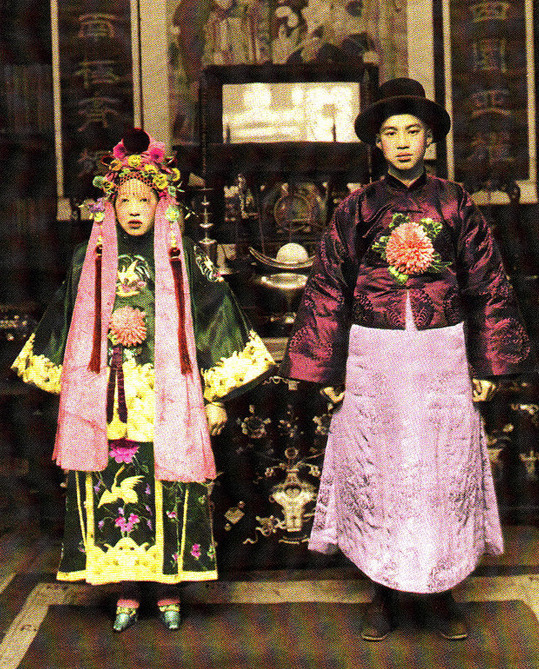
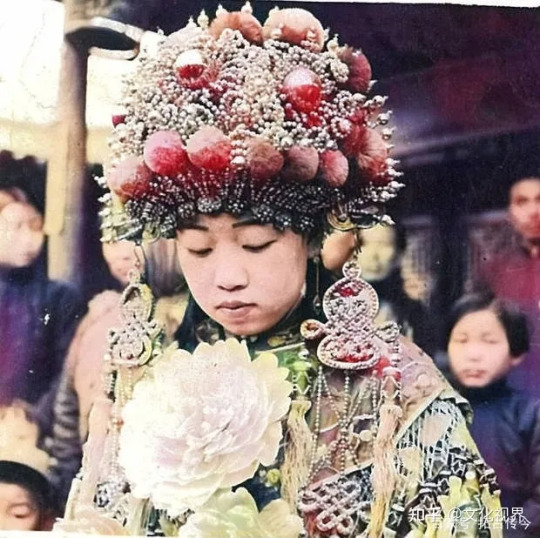
For some reason it's been extremely difficult to find sources on the origin of rongqiu that would shed more light on its significance, but based on historical paintings the use of rongqiu as a head ornament may have originated in the Qing dynasty. During the late Qing dynasty, it was fashionable among women to wear rongqiu on the sides of their hair, as can be seen in the paintings below (x):

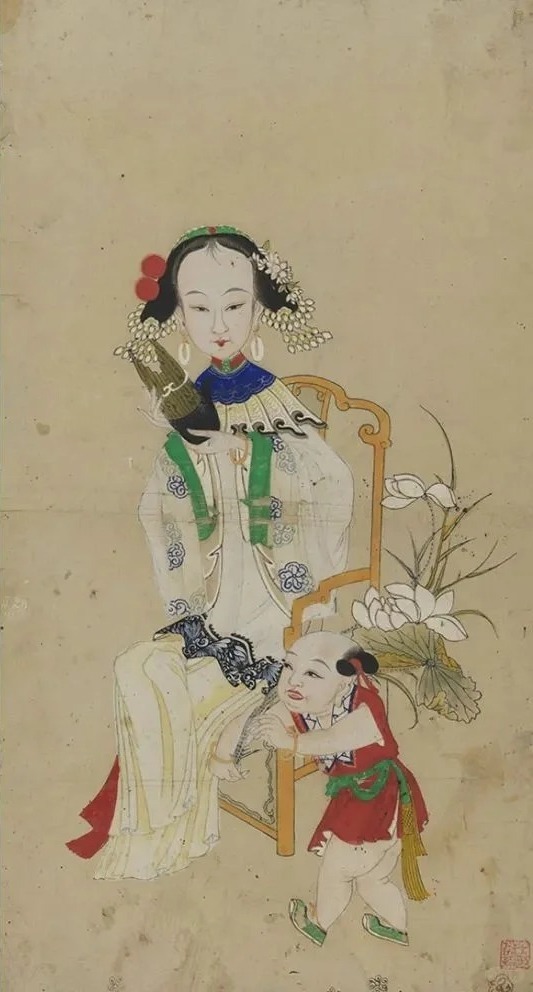
This particular style of rongqiu hair ornament was depicted in the 2012 historical cdrama 娘心计/Mother's Scheme:
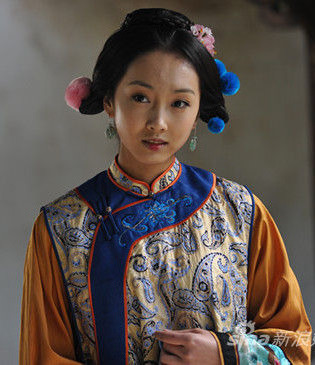
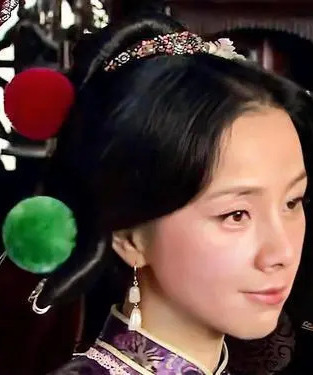
For more references, please see my rongqiu and kuitou tags.
If anyone has more information on the significance of rongqiu, please do share!
Hope this helps ^^
#rongqiu#pompoms#kuitou#chinese opera#opera costume#xifu#hanfu#history#reference#ask#reply#junpeicindystories#chinese fashion#chinese clothing#china
505 notes
·
View notes
Text
guilty conscience ☆ part one


⭑ part 2 , part 3 , part 4 , part 5 →
synopsis: it’s your first year at college and you’re 1,500 miles away from home. you’d feel completely alone if it wasn't for your attractive roommate ellie. will this attraction complicate the already uncharted territory? or will she be the answer to all your problems?
|✯| pairing & wc: college!ellie williams x roommate!reader. wc: 1.4k
|✯| cw (by part): 18+ themes (MDNI), fem reader, modern au!ellie, feelings of angst, sexual themes on like the verge of smut, some swearing
a/n: hey lovelies!!!! this my first time posting a fic so plz enjoy. feedback is appreciated as long as it is constructive. im new to all of this, and still learning. i plan on making this into a series so expect more coming soon. sorry if this chapter is very reader-centric. once reader gets to know ellie better, i’ll write more about her perspective. this will be a slow burn despite part 1 already having sexual themes (lol sorry, couldn't help it), but do expect eventual real smut <3 <3 (p.s: lets b mutuals, message me!!)


As you packed the last of your belongings into your parents' 2008 Toyota, excitement was the last thing you were feeling. When speaking about college, most people explained this coming of age experience with phrases like “change”, “hard work”, and “no sleep”. These pessimistic descriptions made the big move that much harder. Unlike your friends from high school, you were crossing multiple states to attend your dream school. You would’ve been stuck in your home state too if it wasn’t for your impressive art portfolio which earned you a full-ride. Art school is where you know you’re meant to be, but the anxiety of doing it alone lingered.
Of course you were happy to be escaping the grapples of your small Republican town, but you couldn’t help but wonder if 1,500+ miles would really be the solution to all your problems.
★,。・:*:・゚☆。・:*:・゚★
“God where is she??” you grunt to yourself. The brown swivel chair provided as dorm furniture was your only source of entertainment. You spun around in circles, checking your phone every few minutes. You were anticipating a text from Ellie Williams. Through the cracked screen your phone read 11:03pm and the notification wall was empty.
Ellie is supposed to be your roommate. The two of you had met through the university's online roommate matching system. Your interactions were limited to the few texts sent back and forth about move-in times and who’s bringing what. Ellie was supposed to show up 5 hours ago to move in her stuff but she never arrived. You consider messaging her to check-in but Ellie’s previous texts wreaked of un-interest so you thought it best to leave her alone. You knew nothing about the girl, or even what she looked like, but with her stand-offish demeanor and your overthinking, a friendship didn’t seem in the cards.
Another half-hour passes before the sound of keys rattling pulls you out of your trance. Realizing you’re about to be face-to-face with your new college roommate, you snap up from your slouched position and push your hair behind your ears in preparation.
The slender door lazily swings open and your gaze quickly shifts to the faux wood floors. There was a sense of hesitancy, like you weren’t ready to see your fate just yet. A pair of dirty, black converse covered in writing sulk into your line of sight, triggering you to look up. As you did, your eyes were met with the most jaw-droppingly beautiful girl you’ve ever seen. Peeking through her messy auburn locks were piercing jade green eyes and an angular nose scattered with freckles.
It was Ellie Williams, and she was the epitome of “cool girl". Your head spun with all kinds of thoughts as your physical body went idle. You sat before Ellie gawking until she broke the awkward silence that had gone unnoticed by you.
“Uh, hi… I’m sorry for coming in so late… some stuff came up. But uh, I’m Ellie Williams.” She held her right hand out towards you to shake it. It took you a second, but you snapped out of her spell and quickly shook her hand in return.
“Shit- Ellie, hey, it’s uh, nice to finally meet you.” You stumbled through your words as nerves overpowered your usual confidence. There was an obvious awkward tension between the two of you. A typical feeling when moving in with a complete stranger.
Silence loomed in the air as Ellie took a stationary tour around the small, 12 x 20 ft. dorm. She surveyed your side of the room, taking note of any items that could hint towards who you are as a person. Her eyes stopped on a band poster you had hung up just hours ago.
“You listen to Sleater-Kinney?” she inquired.
“Hell yeah, they’re one of my favorite bands. Honestly anything in the riot grrrl music scene is right up my alley. Do you listen?” you replied with more enthusiasm and less nerves than before.
“Yeah, yeah I do,” Ellie answered nonchalantly. You took note of her answer realizing what it could mean. Sleater-Kinney was like the gayest band ever, and Ellie definitely knew that. Maybe she just likes them for their music, but it's possible she also found the lyrics laced with sapphic pining to be relatable. Selfishly, you were dying to know her sexual orientation. Ellie seemed like too much of a stranger to ask her outright and so the game of reading between the lines began. Little did you know, Ellie was wondering the exact same thing about you.
It was getting late and Ellie decided to save unpacking for the morning when she wasn’t so tired. You climbed onto your stiff dorm mattress and fluffed your pillows for sleep. Ellie did the same in her bed.
“Is it cool if I turn out the lights now?” you asked, still navigating the new social dynamic as roommates. Ellie replied with a gentle hum and you hit the switch turning the room pitch black. As you lay in bed all you can think of is Ellie and the future. You didn’t know what it was, but you knew she was special, and you yearned to understand her. With these thoughts in mind, your eyes slowly begin to droop and you slip into a deep slumber.
The next thing you know Ellie is sitting at the foot of your bed staring straight into your soul. Her beautiful green eyes felt especially intense as the rest of her face was shadowed from the dark room.
“Ellie- I-” you could barely get out 2 words as you sat up from bed flustered. You felt like prey and she was the hunter… and you liked it. Ellie slowly inched her way toward you, crawling on hands and knees. She didn’t have to say anything, you knew what she wanted.
Your plush thighs sat between her knees and her crotch hovered over yours, heat being exchanged. You wanted her so bad. You needed her. Ellie took your chin in her hand and pulled you in close. You exchanged breaths as her lips brushed up against yours. She couldn’t wait any longer and pressed her face into yours, capturing your lips which she so longingly desired for. You fell back onto your pillows and she followed intently.
Her body lay pressed against yours and she desperately shoved her wet tongue into your supple mouth. It was ravenous and you wanted more. You knew she did too as you began to feel the rotation of her hips digging into your pelvis. The heavy breaths coming from her swollen lips were in sync with the fervent grinding. You bucked your hips towards her in a frenzy. Ellie took her veiny hand and ran it along your waistband. As she began to slip it into your pants... you woke up to discover your own hands cupping the heat below and Ellie nowhere to be found.
“What the fuck.” is all you could say. You pulled your hand from your pants and stared at the slick spider-webbing between your fingers. God this was humiliating. You climbed out of bed to wash your hands and glanced at the clock. It was 7:15am and Ellie was already gone. That seemed kinda odd for a 19 year old college student. You wondered where she had disappeared to so early in the morning.
Soon, the over-thinker took over and you began to grapple with the possibility that you said something out loud during your naughty wet dream. What if Ellie heard you? God what if you moaned her name?? What would you even say if she brought it up? Before you could formulate a hypothetical response, Ellie walked right through the door.
“AHh-” you yelped, startled by her presence. Ellie backed into the doorway holding a coffee in each hand.
“God, sorry, you scared me.” you explained. Ellie shuffled back inside, twiddling her thumbs trying to decide what to say.
“Sorry, I just left to grab some coffee early this morning. I couldn’t sleep.” She continued, “I brought you one too. As an apology, for any trouble I might have caused by showing up at almost midnight to move in…”. Your cheeks flushed with color and you hoped she didn’t notice.
“Oh, thanks Ellie, that's nice. I promise there was no harm done.” you answered, trying to sound as nonchalant as possible. Seemingly enough, this news meant she was awake while you were, ya know... dreaming. Ellie definitely wouldn’t bring a pervert coffee though. Right? Either way, you knew one thing for sure, you've got to have her.

← masterlist ⭑ part 2 →
#ellie williams#wlw#ellie williams x reader#ellie williams fanfic#ellie x fem reader#tlou 2#the last of us#ellie smut#sapphic#ellie williams series#ellie williams smut#ellie tlou#tlou 2 smut#the last of us 2#ellie x you#ellie williams fan fiction
834 notes
·
View notes
Note
Can you please say more about the Lanterns' politics?
I am so glad you asked me about this because I've been thinking about it since I reblogged that post but also I'm definitely about to get yelled at lol. ANYWAY THIS IS GOING TO BE LONG.
Tl;dr: John is the only one with a coherent political position or an up-to-date voter registration.
Hal:

So something interesting about Hal is that his stories are often very political but his character is not. With one extremely obvious exception, he rarely talks about politics; rather, he serves as a means through which to tell political stories, usually unintentionally.
What do I mean by that? Well, for example, in the Silver Age, his love interest would occasionally be possessed by a misandrist space jewel that would force her to attack him, but always lose because women are inherently inferior to men and prefer to be subjugated by them anyway. That's the original Star Sapphire concept. It's wildly misogynistic, but it doesn't mean Hal the character is misogynistic. But it's also a very political story, even if I don't think the writer was deliberately trying to make a point so much as...being an average, thoughtlessly sexist guy living in the 60s. (Carol continues to be the subject of mindbogglingly sexist writing and art well into the 2000s. Fucking comics.)
And so you have Hal Jordan, whose love life was ruined by his girlfriend getting promoted above him and who called his best friend by a racist nickname for decades; Hal Jordan, poster boy for chest-thumping post-9/11 kneejerk patriotism; Hal Jordan, lightning rod for a certain kind of regressive bigoted fanboyism. Choosing Hal as the Lantern for a particular story over John or Kyle has come to signify something very specific, but none of that is necessarily reflective of what Hal himself believes.
So what about Hal himself? Well, when we first meet him, he's the epitome of privilege: a white, straight, cis, Christian (I know he's canonically half-Jewish now but that's only as of the past decade or so), ablebodied, upper middle class (Geoff Johns retconned him to have a working class background, but in the Silver Age, he had one uncle who was a millionaire, another who was a judge, and a successful politician brother) man with a flashy job. Privilege tends to lean Republican; even if he is from California, I suspect Hal voted for Eisenhower in 1956.
In GL/GA, the word "Republican" isn't used to my recollection, but Hal is definitely presented as...I'm going to say conservative by I mean lower-case C. He doesn't have deeply held political beliefs, but he's traditional. He doesn't question the system, because he's never had to. He resists things that challenge the way he's always understood the world works, and that's very relatable - most people do! And he will absolutely argue with Ollie, who certainly isn't always right about everything. But he's also willing to listen, and have his mind changed, and certainly reachable via appeals to compassion and fairness.
Once the "relevance" trend of the late 60s-early 70s was over, Hal's stories default back to ostensibly politically neutral, although obviously nothing is actually politically neutral. In the late 80s and early 90s he's the most unpleasant version of himself, and that has political manifestations, like when he allows John to be imprisoned in apartheid South Africa for a ridiculous and unnecessary crime Hal himself committed. It's extremely fucked up, but again, it's less because of Hal's actual opinions and more because Christopher Priest wanted to write about apartheid, even if it does make Hal look incredibly, horrifically racist.
Then jump to the mid-2000s and Green Lantern: Rebirth, and you might imagine that losing his hometown, getting possessed by a giant space bug, becoming a supervillain, dying, and becoming the embodiment of God's vengeance might have some effect on Hal's politics, but that is not what Geoff Johns is here to write. Johns is writing a Hal who teleported in from, like, 1967 - no nuance allowed. He's a summer blockbuster that walks like a man. He's a Baja Blast. He's never had a coherent political thought in his life. In his defense, he has had more and goofier concussions than any superhero I can think of and his brain is smooth like an egg. Still.
Anyway, all of this is to say that I think Hal tends to default to center right positions but can be easily coaxed over to center left. That said, he has never not once in his life had his shit together enough to vote in a single election, not even for his own brother.
Guy:

So Guy's deal is a little bit complicated because his most vocally political era was also in part due to severe and personality-altering brain damage.
When Guy was originally introduced in the 1960s, he had the pleasantly bland personality of all superheroes. Many years later, he suffered a series of major injuries, torture, and a lengthy coma, and he emerged from the coma in 1985 with the aggressive, abrasive personality he's best known for today. Justice League International took that even further, using him to parody the jingoistic, red-blooded American action hero of the 80s.
This version of Guy is a vocal fan of Ronald Reagan and despises the USSR. He's pro-war, proudly xenophobic, and treats women badly enough that it crosses the line into repeated sexual harassment, both physical and verbal. (To be fair...ish, this last also applies to Wally West and arguably a number of other men, and was always played for laughs. It was gross all around.)
Again, this is partially a manifestation of his brain damage. There's also a running gag in JLI where if he gets hit on the head, his personality changes to this cloying, timid, gentle one, sort of halfway between a child and a flamboyant gay stereotype. Hit him again and he goes back to Asshole Guy. I'm not going to pretend I don't find some of the gags funny, but it's obviously all highly problematic, and not just from a medical standpoint.
That said, I don't think we can dismiss Guy's politics or his usual personality as simply a manifestation of brain damage. We see in later flashbacks that he developed the abrasiveness as a defense mechanism from growing up in an abusive home, and as he matures through the 90s, he doesn't actually become a significantly different person, even after his Vuldarian healing factor kicks in and heals his brain. (It's a thing.) I think it's more accurate to say that the brain damage probably affected his impulse control, his filter, and arguably even his paranoia levels.
All of which is to say that as much as I would love to go "Guy's better now, so he's not a Republican!"...that dog won't hunt. I think a really good canon writer could make the case that Guy is pro-union-style working class and also a former teacher so he's at least center left, but as of now canon evidence is pretty firmly on the red side. It doesn't help that the GLC has been written as fetishistically pro-cop and pro-military since Johns got his grubby hands all over it. I will happily ignore the New 52 retcon that Guy was a cop, and you could even try to argue that he dislikes cops because his brother was a corrupt cop who became a supervillain, but I think it's much more likely that he identifies with cops as a Corps member. Although I don't think he would have any patience for killer cops. ("You were afraid for your life even though you were the only one with a weapon? Then fucking quit, coward.")
All of that said, I think Guy is similar to Hal: defaults to center right, can be talked into center left on certain issues but he's more stubborn about it. (They would also both be enraged by Jan 6 and disgusted by the current Republican party - I can't quite argue that Guy Gardner is a Democrat but Green Lanterns don't have any patience for traitors or cowards.) It's also kind of a moot point because he never knows what is happening on Earth and hasn't voted since his pre-coma days.
John:
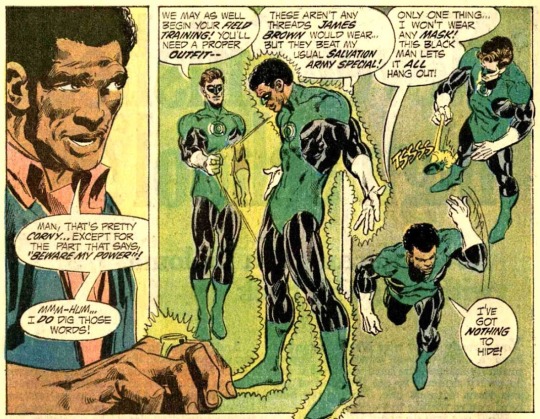
Oh John Stewart, thank god for you.
John was introduced as an explicitly political character in an explicitly political story. The first time we see him, he's stepping in to defend Black men from a white cop, citing his own knowledge of the law to do so. He shows a much more perceptive and informed perspective on the issue's main plot (a racist senator running for president) than Hal does. Even in the little moment above, we see that he's sensitive to exactly what it means for him, a Black man, to be taking on this role.
None of this is a surprise, since we'll later learn that John's parents were civil rights activists. Not only would he not have had the privilege Hal and Guy did to assume his existence was politically neutral, he was explicitly educated about political realities and progressive advocacy from childhood. He's well-informed, he's passionate, and he's going to tell you when you are being fucking stupid.
John isn't immune from the GL cop/military...thing, although I can't blame Johns for that - it was the cartoon that made him a Marine, and the comics followed suit. But that's never outweighed his origin or his upbringing. Like, he's friends with the DCU's fictional version of Nelson Mandela.
This one is straightforward: John is a staunch progressive. He is, however, in outer space 90% of the time, so he's always at least a little bit out of date. I imagine every time he comes back to Earth he spends the first 24 hours watching the news in abject horror.
Kyle:

Kyle doesn't talk about politics a lot, but when he does, he lands pretty much where you'd expect a young California-born artist living in New York City to land: to the left. My read on Kyle is that he hasn't really thought any of his politics through, which makes sense - he's a character who is led by emotion over reason every time. He doesn't have John's carefully thought-through arguments or knowledge of the law behind him. I feel like when something political upsets him, he's more likely to splutter angrily than make a coherent argument (which: same). When he's given the time to think things through and speak from the heart, though, he can be very eloquent, like in his speech to Terry after Terry accidentally comes out to him.
It's also worth pointing out that his solo appearances were mostly in the 90s, which were prone to avoiding politics or only addressing them in a halfhearted both sides-y way like the story above.
That said, I don't think he ever actually does anything about his political opinions. He never votes in midterm or primary elections, and probably only voted in a presidential one because Alex dragged him along one time. I feel like Donna tried to do the same when they were dating and that was when Kyle realized he'd forgotten to change his voter registration from California to New York. Jennie wasn't responsible enough to Mom him into doing his civic duty, and he's been in space pretty much nonstop ever since, so...
Simon:
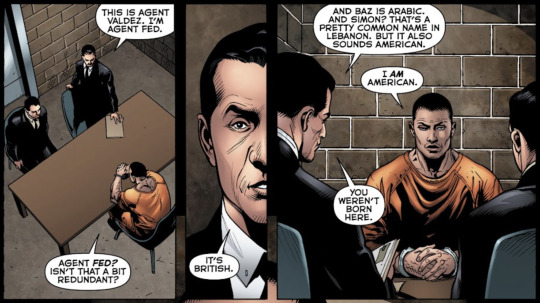
In that other post, I said Simon's experiences should have radicalized him, but instead he was created by Geoff Johns. Simon is a Muslim, Lebanese-American man who came of age in the post-9/11 era, and was wrongfully convicted of terrorism and waterboarded at Guantanamo Bay. His reaction to this was...to put on a ski mask and wave a gun around. Like, it's been a while since I've read these issues, but aside from the "ripped from the headlines!!!" of it all, I feel like Simon's experiences largely don't inform his actions or perspective except that he's super angry (fair enough).
The thing about Simon (and Jessica) is that he hasn't been around very long, and most comics don't have characters directly expressing political opinions. It's not a coincidence that these characters are in chronological order and each write-up is shorter than the last. I can think of about three times where Kyle has ever said anything I can interpret as political, and he's been around for 30 years. Simon only has a third of that history. So while one could certainly extrapolate what Simon's opinions are likely to be, I can't think of any canon where he actually says them.
Jessica:

Jessica has even less to go on in terms of explicitly political comics. You'd think she wouldn't like guns because of what happened to her friends, but she has one of her own and doesn't seem bothered by Simon's. I'd imagine she has opinions on immigration as someone whose family is from Mexico and Honduras, but it never comes up. If I were writing for DC, I'd make both Simon and Jess leftists, but as for actual canon proof? I got nothing.
I will say that she probably avoids political discussions because anxiety, and I bet she got really good at voting by mail during her years not leaving the house. She probably votes by mail from space. Maybe John's not the only one with an up-to-date voter registration.
Kilowog:
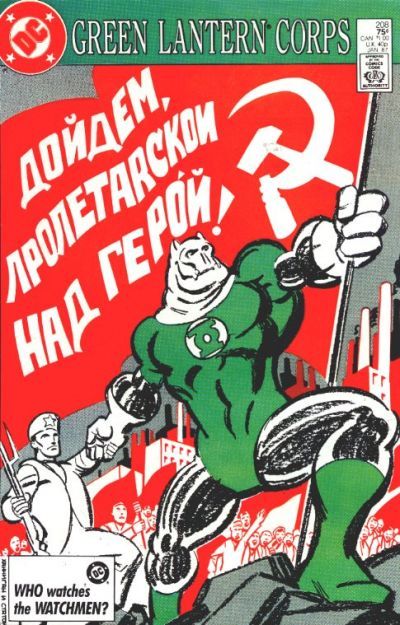
96 notes
·
View notes
Text
Notes on Roman demography:
It's really, really hard to estimate how many people lived in Rome or in Italy as a whole. In republican times, the census only counted free adult men.
Augustus' census recorded 4 million people in Italy, but we don't know how to interpret this number. If it's like earlier censuses (male citizens only), it implies a total population of around 10 million, and a big surge in the last 200 years.
But our literary sources almost all imply the population was stagnating or declining due to the wars and famines of the 1st century BCE, and Augustus himself thought the population was declining.
So, most historians now think the 4 million number does include all Roman citizens in Italy, male and female. If so, this is indeed a decrease from the 4.5 million we've estimated for 225 BCE, based on Polybius' account of the Second Punic War.
Losing over 11% of the population, even after adding new citizens through manumission, immigration and colony-founding, would have had massive effects on politics. (It's the equivalent of the USA losing 37 million people.) This may have made the surviving Romans more willing to accept Augustus' autocratic rule, which at least promised stability. It might have offered career opportunities to new men like Cicero and Marcus Agrippa as the ranks of the nobility were thinned. And I strongly suspect it contributed to Augustus' notorious marriage laws, which unsuccessfully tried to incentivize having more kids.
I also wonder if high mortality rates are part of the reason Rome was so open to integrating foreigners as citizens. Rome was at war nearly every year, and in the Second Punic War (for instance) lost over 25% of its adult male population in battles. (1)
However! Rome's slow recovery during and after the Augustan age, plus greater economic mobility, helped the population bounce back, reaching a high around 120 CE of 1 million in Rome and ~75 million for the empire as a whole. (2)
(The population and economy got so big we can see traces of it in polar ice cores - they raised Earth's carbon dioxide levels!) (3)
Life expectancy at birth was probably around 25-35. Half of all children probably died before the age of 10, but if you lived past that, it wasn't unusual to reach your 50s or 60s.
Slaves made up somewhere between 20-33% of the population of the late republic. (4)
Freedmen made up another big chunk. The highest estimate I've seen was 50% in Rome itself; lowest is around 20-25%. But in any case, there were a lot. (4)
Due to such high child mortality, and adult mortality due to war and disease, the average Roman woman gave birth around nine times. This partly accounts for why Roman girls were married off in their teens. The age gap between first-time brides and their husbands, and the number of pregnancies and children, were major systemic factors that kept Roman women subjugated under patriarchy. (5)
Adrian Goldsworthy, Antony and Cleopatra
Walter Scheidel, "Demography," The Cambridge Economic History of the Greco-Roman World.
Mary Beard, Meet the Romans (documentary series)
Erich Gruen, The Last Generation of the Roman Republic
Mary Beard, SPQR
The rest comes from Neville Morley's "Social Structure and Demography," in A Companion to the Roman Republic, ed. Nathan Rosenstein and Robert Morstein-Marx.
#my epubs make it hard to cite page numbers but poke me if you need a quote to ctrl+F#roman demography#neville morley#social structure and demography#a companion to the roman republic#jlrrt reads
95 notes
·
View notes
Text
Young women are more likely to identify as liberal now than at any time in the past two decades, a trend that puts them squarely at odds with young men.
44% of young women counted themselves liberal in 2021, compared to 25% of young men, according to Gallup Poll data analyzed by the Survey Center on American Life. The gender gap is the largest recorded in 24 years of polling. The finding culminates years of rising liberalism among women ages 18 to 29, without any increase among their male peers.
Several societal forces have conspired to push young women to the left in recent years, including the #MeToo movement, former President Trump, rising LGBTQ identification and, most recently, abortion policy. Slower-cooking trends in marital status and educational attainment have also nudged the needle.
“I think there is a big generational shift that happened with Generation Z women who were really coming of age in the last five years,” said Kelsy Kretschmer, a sociologist at Oregon State University who studies gender politics.
The rift between young men and women may widen further. Earlier this year, the Supreme Court overturned Roe v. Wade, a precedent that had protected abortion as a constitutional right for nearly half a century. The ruling has energized young women. New survey data, released this week, shows that 61% of young women consider abortion a critical issue, compared with 36% of all Americans.
“I would always choose a candidate that’s pro-abortion,” said Rose Merjos, 21, a government major at Wesleyan University in Connecticut who is an avowed liberal. “Almost everyone either knows someone who has had an abortion or has had one themselves. This is something everyone can relate to.”
The share of men who identify as liberal has held fairly steady for almost 25 years, according to annual Gallup surveys. Roughly one-quarter of men ages 18 to 29 term themselves liberal, year after year.
Meanwhile, among young women, liberalism has exploded. In the late 1990s and early 2000s, fewer than 30% of women identified as liberal. The liberal camp grew through the second term of former President George W. Bush. It expanded further during the tenure of former President Obama. It reached 39% in 2017 with the inauguration of Trump. In the last two years, liberalism surged anew.
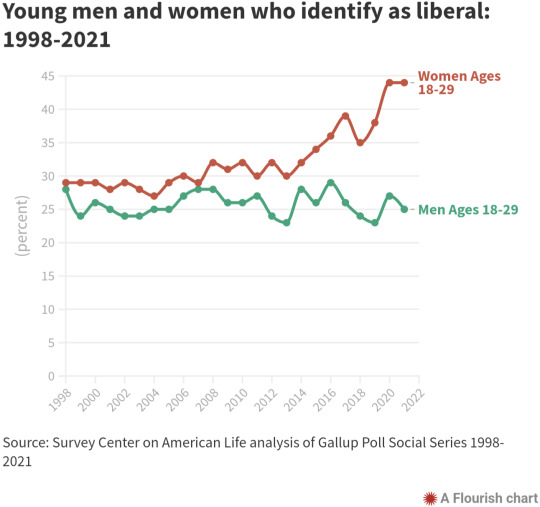
“Young women today are much more liberal than young men,” Daniel Cox wrote in a June newsletter of the Survey Center on American Life, a project of the American Enterprise Institute. His work documents “a growing political rift” between young women and men.
Merjos attends a university long associated with both liberalism and activism. These days, though, she senses more of both among the women.
“In all of my government classes, there are probably two men out of 18 people,” she said. “ACLU [American Civil Liberties Union], that’s mostly women. I’m wondering if women are maybe just more inclined to be involved in the community, engaged in the community. And that liberalizes them.”
Ezra Meyer, 22, is a senior at the George Washington (GW) University who leads the College Republicans. He is a conservative on a campus that is overwhelmingly liberal and largely female. In conversations with classmates about politics, he treads lightly.
“My metric for deciding if I’m going to be friends with someone really does not come down to what their politics are,” he said. “It comes down to how tolerant they are.”
Meyer doesn’t know whether the men at GW skew more liberal or conservative than the women. But he has noticed a distinct trend among campus conservatives this fall.
“We’ve been doing a lot of recruiting of freshmen on campus,” he said. “And I would say, overwhelmingly, it has been male. The conservative females that do get involved, there’s fewer of them, but they tend to be way more passionate and way more involved.”
Several factors have liberalized the nation’s 20-something women. The most recent, and perhaps the most powerful, is #MeToo, an uprising against sexual assault, abuse and harassment that caught fire in 2017, empowering millions of women to come forward and seek justice.
The inauguration of Trump in the same year pushed more young women into the liberal column. The 45th president battled his own #MeToo allegations and proved uniquely unpopular among young, female voters. Polling in 2016 showed that only 25% of women ages 18 to 34 favored Trump, compared with 40% of same-aged men.
The rise of liberalism among young women has also marched apace with a dramatic increase in young people identifying as lesbian, gay, bisexual, transgender or queer. In a recent survey, 56% of young women reported exclusive attraction to men, while three-quarters of young men said they were solely attracted to women. Prior research suggests LGBTQ Americans of all ages trend toward liberalism.
Several longer-term trends have fed the liberalization of young women as well. One is marriage. The share of women ages 18-29 who are married has fallen by half in twenty years, from 31% in 2000 to 15% in 2021, according to the National Opinion Research Center.
The growing ranks of single, 20-something women feel a sense of “linked fate,” researchers say. They gravitate toward female friends in political views, whereas married women more often mirror the politics of their spouses.
“The correlation between women’s sense of linked fate and liberal political preferences suggests that the Democratic Party will benefit” from declining marriage rates among young women, Kretschmer and two co-authors wrote in a 2017 paper for the journal Political Research Quarterly. They noted that “women make up the majority of the population and vote at high rates.”
Women also outpace men in educational attainment, a trend that dates to the 1980s. The ratio of women to men in college enrollment now stands at roughly 60 to 40, and it continues to grow. Americans who complete college are more liberal than those who do not.
“Putting off marriage, going to college, entering the workforce, women are doing that at much higher rates than they used to,” said Marc Hetherington, a professor of political science at the University of North Carolina at Chapel Hill. “And all of those things are going to make conservatism and the Republicans significantly less attractive to women.”
In 1998, the first year of data collected by Gallup in its Social Series surveys, 28% of young men and 29% of young women identified as liberal. The gender gap in liberalism grew steadily wider in the 2000s, wider still in the 2010s. The 2021 poll yielded a 19-point spread between young men and young women, the largest on record.
“I do have some male friends that are moderate,” said Luci Paczkowski, 20, a California liberal. “And it annoys the hell out of me.”
What bothers Paczkowski about her nonliberal friends is not their centrism but her suspicion that they “do not have any clue why they are moderate. They just do not want to pick a side and, therefore, they are apathetic.”
#us politics#news#the hill#2022#liberals#liberalism#Democrats#polls#polling#Survey Center on American Life#Gallup Poll#conservatives#conservatism#republicans#graphs#data#National Opinion Research Center
363 notes
·
View notes
Text
Steve's parents were definitely Reagan Republicans mainly due to his fiscal policies that allowed them to exploit people and make more money. But that also means whether superficially(or worse genuinely) were part of that "moral majority" bs. So imagine Steve, late middle school aged being stuck going to some fundraiser event his parents are hosting during Reagan's first election campaign.
He would have to sit and listen while people alluded to "family values" and other euthanisms for being anti-queer. And Steve may not always be book smart but he is not stupid. His parents and all their friends were affirming that him liking anything but women was wrong and gross and un-American. So he hid the fact that he liked guys in his class as much as girls. Focused on only his romantic feelings for girls. Wouldn't shut down Tommy when he made homophobic remarks even though it killed him because not only had Tommy been his best friend since the 5th grade, but he had also been his first crush.
But as he got older, and grew close to The Party and the other older teens, he started to feel like maybe his parents were wrong. Maybe people like he and Robin and Eddie and Nancy and Jonathon and Argyle and the kids deserve to be themselves, deserve to love whoever they want. And eventually he finds his romantic soulmate in Eddie, and they are so happy together.
Meanwhile, his parents left Hawkins permanently after the "earthquake. Ended up selling the house, sent Steve some money for a security deposit and first month's rent, and barely have kept in touch since. It's okay, Steve talked to them in obligatory phone calls a couple times a year. He doesn't really miss them. They haven't particularly been there for him most of his life. He and Robin (and later Eddie and Nancy who move into their respective partner's rooms) share that apartment and are happy.
So imagine their surprise in 1988, when they turn on the TV, they see their son on TV kissing the Munson boy at a protest in Chicago over the government's response to the AIDs epidemic. Standing next to them is all their friends, many in queer relationships of their own. Eddie is holding a sign saying Silence=Death, and Steve’s sign simply says "Fuck Ronald Reagan" And that's how his parents found out he was queer and that he hated Reagan.
339 notes
·
View notes
Text
Right now is the time to get involved in the defeat of America's most dangerous enemy since the Cold War.
The traditional election season, starting on Labor Day, is a thing of the distant political past. And considering the magnitude of the threat to democracy, even waiting for the end of the primary season may be too late.
The worst president in our history is, arguably, stronger within the leadership ranks of the Republican Party than he has ever been. He is now the most dangerous presidential candidate in U.S. history. As a consequence, the great question before the rest of us is whether enough of us are ready to do whatever is necessary to defeat this threat as we have all those that have come before.
Sadly, there is reason to believe that this time we may not meet the challenge. Right now, Donald Trump is one of two people who could be our next president. The race, at the moment, between him and President Joe Biden, is too close to call.
The people with their heads up their ass over Biden's age are either hypocrites or dissemblers. On Inauguration Day 2025, Donald Trump will be 95.66% of Joe Biden's age. And Trump will also be older in January of 2025 than Biden was upon assuming office in 2021. Biden may have a lifelong stutter but he is still grounded in reality in a way the narcissistic nepo baby Donald Trump never was.
Joe Biden by any objective metric has been one of the most successful presidents in modern U.S. history. He has led the creation of more major legislative initiatives benefiting the American people than any president in 60 years. He oversaw the creation of more than 14 million jobs during his first three years in office. He has brought down inflation and reduced the prices of vital medicines to affordable levels. He has restored American leadership worldwide, expanded our vital alliances like NATO, and stood up to our enemies. All presidents face challenges and make missteps. But it is hard to deny that in the wake of the U.S. economic recovery, the passage of the American Rescue Plan, the Bipartisan Infrastructure Bill, the CHIPs and Science Act, and the Inflation Reduction Act, the expansion of NATO, and the creation of new Indo-Pacific alliances, Biden’s record is formidable.
That a president with this record is in a horse race with a candidate who is a menace to the country, who led an insurrection, who is a pathological liar whom courts have found to be a fraud and a rapist, and who has no real ideas, no credible policy proposals, no record of actually ever achieving anything for the American people is chilling.
In normal times, over 40% of US voters would NOT pick a notorious sex offender for president. But these are not normal times.
You would have thought that the sight of mobs carrying Trump flags and weapons and chanting for the death of Vice President Mike Pence on January 6, 2021, would have been alarm enough. You would have thought the same of Trump’s Access Hollywood tape, in which he confessed his impulse to abuse women. You would have thought the two dozen women who accused him of abuse would have had that effect. Even if none of those things were quite warning enough, you would have thought the findings in the E. Jean Carroll case would have been enough. After all, respected federal judge Lew Kaplan wrote, “The fact that Mr. Trump sexually abused—indeed, raped—Ms. Carroll has been conclusively established and is binding in this case.”
It should have been enough. But so far, it has not been.
And who would have thought that the party of Ronald Reagan is now led by a stooge of the Evil Empire?
You would have thought that Trump reaching out on national television to our Russian adversaries for aid during the 2016 campaign would have been enough. You would have thought the conclusive findings of every major U.S. intelligence agency that Russia sought to aid Trump’s campaign would have been enough. You would have thought that Robert Mueller’s finding 10 instances of possible obstruction of justice by Trump would have been enough. You would have thought Trump kowtowing to Vladimir Putin and taking his word over that of our intelligence and law enforcement communities would have been enough. You would have thought his illegally withholding aid to Ukraine to seek dirt on Joe Biden would have been enough. You would have thought his impeachment for that would have been enough.
Are you willing to spend more time and money than in previous election cycles to end a major threat to Western democracy and to undermine homegrown fascism for at least the rest of this decade?
So, ask yourself, is that enough to make you do more than you have done? Is that enough to commit for the next 10 months to do more than you have ever done during an election year? To give more? To canvas more? To spread the word more? To help get voters to the polls? To ensure every member of your family, your friends, your co-workers do the same? The stakes are too high to do less than everything you can.
I rarely quote Margaret Thatcher and would probably disagree with at least 90% of her views. But she did know something about winning elections and combating the USSR. If she was good for just one thing, it's for this observation in a speech made in her retirement.
[N]o battles are ever finally won; you have to go on winning them by example and by being prepared to defend your way of life against those who would attack it.
If we learn just one thing from the Trump threat, it's that we can never rest on our past laurels. A slacker democracy is one which will not outlast a determined demagogue.
Civic involvement by pro-democracy citizens is absolutely necessary to maintain freedom.
#democracy#threat to democracy#donald trump#democracy vs. totalitarianism#trump is a tool of russia#trump is a sex offender#if you hate freedom vote for trump#register and vote#vote blue no matter who#support democratic candidates#the biden administration's economic growth programs#civic involvement#david rothkopf#bernard l. schwartz#election 2024
62 notes
·
View notes
Note
I’ve heard that nationalism, which is to say the idea of a larger abstract national identity, was t really a thing until 1500s generally. It probably built over time, and it seems that mid to late 1800s w a lot of unification movements, nationalist platforms, reforms, conquests invasions civil wars etc , a few counties in that period were United into a national identity into the country image they’re generally thought of today.
What I’m wondering, if this is something you’re familiar with, is if you have any recommended reading for this period of 1800s?
I am very interested in seeing how those nationalist sentiments were used to build these coalitions into countries in that newly budding global age
Thank you!
I tend to favor a much earlier date or at least I think we need to give more weight to proto-nationalism as a phenomenon, because I think there's a slight teleological mistake that's made in assuming that national identity has to go hand-in-hand with a national state.
Whether it's in the Hundred Years War or wars for independence in Scotland, Wales, Ireland, or what have you, there was a long period prior to the 1500s where quite local identities could co-exist with a strong negative polarization against outgroups. You might think of yourself as a MacDonald first and a Scot second, but no matter how much you hated the Campbells you knew they weren't English, or you could be a Guelph and simultaneously be a local patriot and want to keep the German Emperor out of Italy, or be Machiavelli and be a devoted Florentine republican but also believe in uniting Italy against the Spanish and the French.
In terms of book recommendations:
Imagined Communities is a must-read.
Greenfield and Breuilly are also good.
I think Hobsawm's work on nationalism is classic.
I would also recommend Moggach and Leduc as well as Mark Traugott on the interplay between nationalism and socialism in 1848.
EDIT: Ernest Gellner in Nations and Nationalism is a very important text, but I would recommend reading him together with his major critic Philip Gorski ("The Mosaic Moment: An Early Modernist Critique of Modernist Theories of Nationalism").
#history#book recommendations#nationalism#medieval history#early modern history#european history#19th century history
33 notes
·
View notes
Note
Please can you explain the difference of meaning between hanfu and huafu ? Sorry if you already got the question
Hi, thanks for the question, and sorry for taking ages to reply! (hanfu photo via)
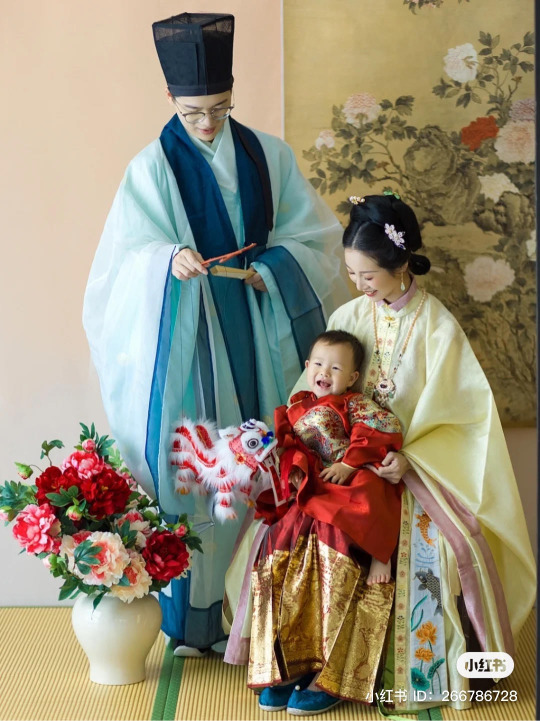
The term “hanfu” (traditional Chinese: 漢服, simplified Chinese: 汉服) literally means “Han clothing”, and refers to the traditional clothing of the Han Chinese people. “Han” (漢/汉) here refers to the Han Chinese ethnic group (not the Han dynasty), and “fu” (服) means “clothing”. As I explained in this post, the modern meaning of “hanfu” is defined by the hanfu revival movement and community. As such, there is a lot of gatekeeping by the community around what is or isn’t hanfu (based on historical circumstances, cultural influences, tailoring & construction, etc). This isn’t a bad thing - in fact, I think gatekeeping to a certain extent is helpful and necessary when it comes to reviving and defining historical/traditional clothing. However, this also led to the need for a similarly short, catchy term that would include all Chinese clothing that didn’t fit the modern definition of hanfu -- enter huafu.
The term “huafu” (traditional Chinese: 華服, simplified Chinese: 华服) as it is used today has a broader definition than hanfu. “Hua” (華/华) refers to the Chinese people (中华民族/zhonghua minzu), and again “fu” (服) means “clothing”. It is an umbrella term for all clothing that is related to Chinese history and/or culture. Thus all hanfu is huafu, but not all huafu is hanfu. Below are examples of Chinese clothing that are generally not considered hanfu by the hanfu community for various reasons, but are considered huafu:
1. Most fashions that originated during the Qing dynasty (1644–1911), especially late Qing, including the Qing aoqun & aoku for women, and the Qing changshan and magua for men. I wrote about whether Qing dynasty clothing can be considered hanfu here. Tangzhuang, which is an updated form of the Qing magua popularized in 2001, can also fit into this category. Below - garments in the style of Han women’s clothing during the Qing dynasty (清汉女装) from 秦綿衣莊 (1, 2).

2. Fashions that originated during the Republican era/minguo (1912-1949), including the minguo aoqun & aoku and qipao/cheongsam for women, and the minguo changshan for men (the male equivalent of the women’s qipao). I wrote about why qipao isn’t considered hanfu here. Below - minguo aoqun (left) & qipao (right) from 嬉姷.
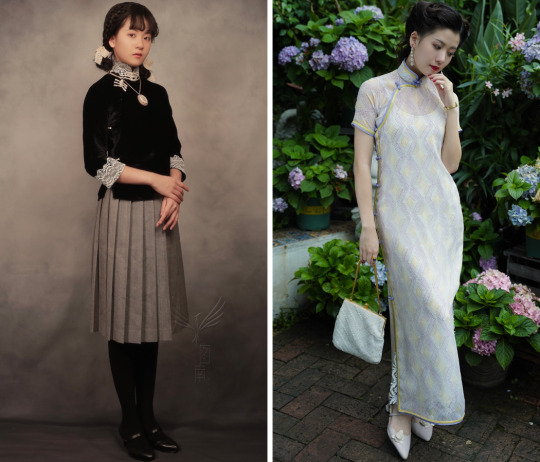
Below - Xiangsheng (crosstalk) performers Zhang Yunlei (left) & Guo Qilin (right) in minguo-style men’s changshan (x). Changshan is also known as changpao and dagua.
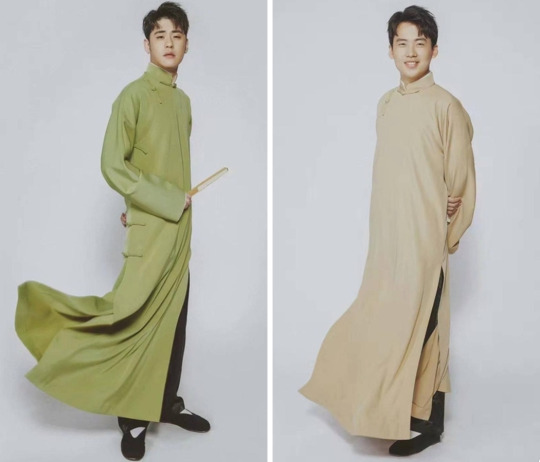
3. Qungua/裙褂 and xiuhefu/秀禾服, two types of Chinese wedding garments for brides that are commonly worn today. Qungua originated in the 18th century during the Qing dynasty, and xiuhefu is a modern recreation of Qing wedding dress popularized in 2001 (x). Below - left: qungua (x), right: xiuhefu (x).
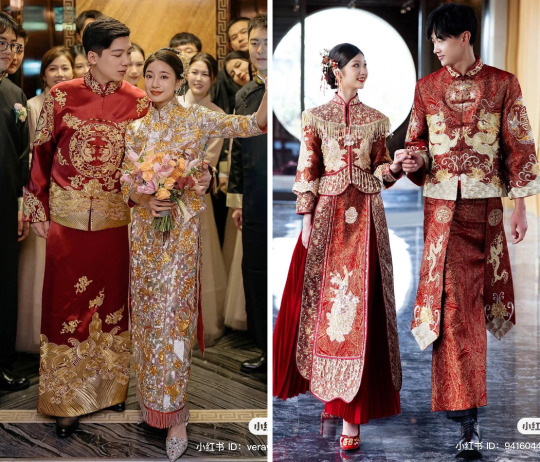
4. Modified hanfu (改良汉服/gailiang hanfu) and hanyuansu/汉元素 (hanfu-inspired fashion), which do not fit in the orthodox view of hanfu. Hanfu mixed with sartorial elements of other cultures also fit into this category (e.g. hanfu lolita). From the very start of the hanfu movement, there’s been debate between hanfu “traditionalists” and “reformists”, with most members being somewhere in the middle, and this discussion continues today. Below - hanyuansu outfits from 川黛 (left) and 远山乔 (right).
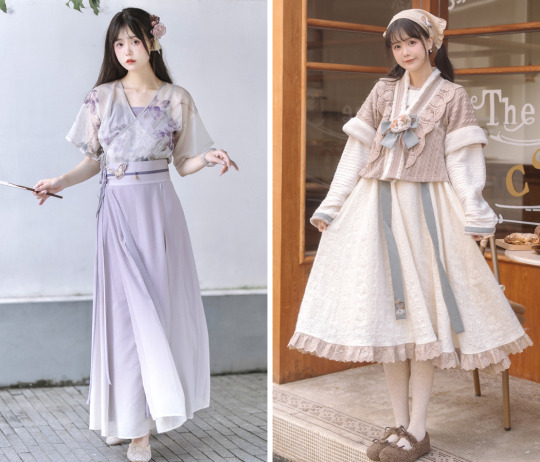
5. Performance costumes, such as Chinese opera costumes (戏服/xifu) and Chinese dance costumes. These costumes may or may not be considered hanfu depending on the specific style. Dance costumes, in particular, may have non-traditional alterations to make the garment easier to dance in. Dunhuang-style feitian (apsara) costumes, which I wrote about here, can also fit into this category. Below - left: Chinese opera costume (x), right: Chinese dance costume (x).
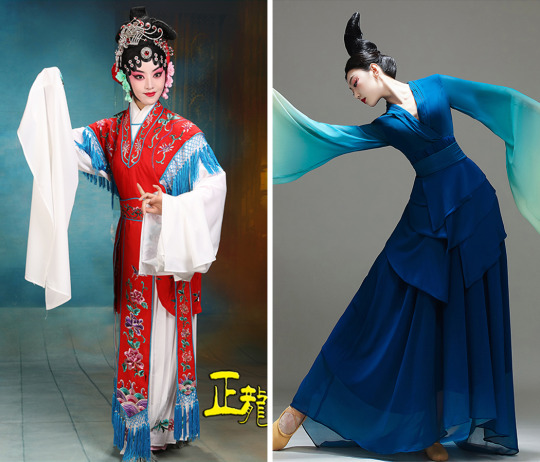
6. Period drama costumes and fantasy costumes in popular media (live-action & animation, games, etc.), commonly referred to as guzhuang/古装 (lit. “ancient costumes”). Chinese period drama costumes are of course based on hanfu, and may be considered hanfu if they are historically accurate enough. However, as I wrote about here, a lot of the time there are stylistic inaccuracies (some accidental, some intentional) that have become popularized and standardized over time (though this does seem to be improving in recent years). This is especially prevalent in the wuxia and xianxia genres. Similarly, animated shows & games often have characters dressed in “fantasy hanfu” that are essentially hanfu with stylistic modifications. Below - left: Princess Taiping in historical cdrama 大明宫词/Palace of Desire (x), right: Wei Wuxian and Lan Wangji in wuxia/xianxia cdrama 陈情令/The Untamed (x).

7. Any clothing in general that purposefully utilizes Chinese style elements (embroidery, fabrics, patterns, motifs, etc). Chinese fashion brand Heaven Gaia is a well-known example of this. Below - Chinese-inspired designs by Heaven Gaia (x).
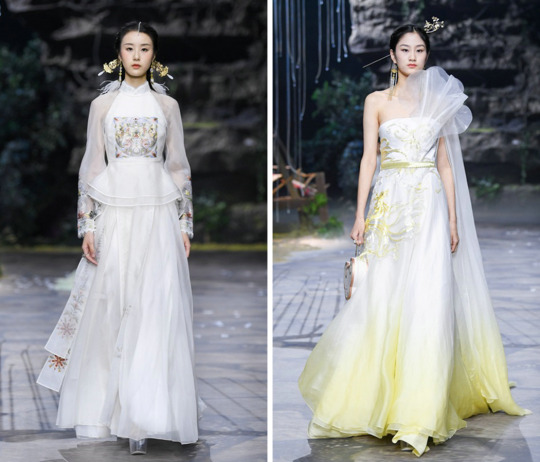
8. Technically, the clothing of China’s ethnic minorities also fit under the broad definition of huafu, but it’s rarely ever used in this way.
From personal observation, the term “huafu” is mainly used in the following situations:
1. Some large-scale events to promote Chinese clothing, such as the annual “华服日/Huafu Day”, will use “huafu” in their name for inclusivity.
2. For the same reason as above, Chinese clothing including hanfu will often be referred to as “huafu” on network television programs (ex: variety shows).
3. A few Chinese clothing shops on Taobao use “huafu” in their shop name. Two examples:
明镜华服/Mingjing Huafu - sells hanfu & hanyuansu.
花神妙华服/Huashenmiao Huafu - sells Qing dynasty-style clothing.
With the exception of the above, “huafu” is still very rarely used, especially compared to “hanfu”. It has such a broad definition that it’s just not needed in situations for which a more precise term already exists. However, I do think it’s useful as a short catch-all term for Chinese clothing that isn’t limited to the currently accepted definition of hanfu.
If anyone wants to add on or correct something, please feel free to do so! ^^
Hope this helps!
#happy 2023!#hanfu#huafu#terminology#language#hanfu movement#history#reference#ask#reply#>1000#chinese fashion#chinese culture#china
2K notes
·
View notes
Note
I don���t know if this is just because I’ve curated my feeds to show me this, but I actually have a sliver of hope that we may stay blue because of all the kids who will be voting age in 2024 being FIRED TF UP against all the human rights violations the republicans are passing/want to pass into law and like. I don’t want the kids to save us. They shouldn’t frickin have to. But if republicans keep being such raging assholes, if they can hold onto that anger until 2024… they just frickin might. I’m genuinely terrified what will happen if they DO NOT, but I have seen so many late-teens-early-20s kids getting out and voting in local elections and doing other things* that helps that I really, really hope they bring that energy to the 2024 election even if our choices are “old white guy who is Actually Doing Okay (could be better but not Genuinely Evil)” and “Orange Incoherent Criminal” or “ Literal Fascist Wannabe Dictator that everyone else actually hates”
(Also, do I wish we had a better option than Biden? Sure. But he’s not doing nearly as bad as a lot of people INCLUDING DEMS want us to believe. Like no maybe he’s not MANY things, but what he is doing is pretty darn good and big and it’s not actual genocide so like. Can we all suck it up ONE MORE TIME PLEASE???)
(*the biggest energy I saw was with the Tennessee Three and I’m like PLEASE BRING THAT ENERGY TO THE PRESIDENTIAL ELECTION I AM BEGGING YOU)
I mean... like I keep saying, the Republicans aren't trying so hard to outlaw voting because they truly think their policies are popular and people legitimately want to vote for them. They have lost the popular vote in every presidential election except one (2004) since the start of this century, and yet in that time, we have still had 12 years of GOP presidents, because the Electoral College sucks anti-democratic donkey dick so hard.
Likewise, yes: if we get our act together and vote in equal or higher numbers than 2020 and 2022, we will probably-to-definitely win. A turnout of just 27% of Gen Z voters stopped the Red Wave in 2022, so if yknow, a few more of them would do so in 2024, that would be nice. Republican policies are toxically unpopular with young people, but these are often also those most susceptible to "evil Democrats/both sides bad" anti-voting propaganda, so it's not always clear how this adds up to extra points for Team Blue.
Anyway, at this point, it's still too early to know what the hell will happen between now and November 2024, how Felonies Georg's charges numbering possibly in the literal hundreds will affect the race, or any of that. As ever, however, we do know that the crazies WILL vote en masse, like they always do, and it is up to us to do our part.
70 notes
·
View notes
Note
Do you think Alfred is insecure about being young? Like I know that there’s countries younger or closer to age to Alfred, but the people Alfred hangs out with the most, has more economic ties, and has military alliances with are way older than Alfred (ex literally all of Europe and Asia). So I was wondering if you think Alfred, being always around people with way more experience than him, feels insecure about being so young and ‘inexperienced’ maybe that’s why he wears glasseS
Interesting question! As I see it, yes and no.
Yes—in the 18th century, when he was much younger, and rebelling against Arthur. Going hat in hand to the other Old World empires and nations like Francis and Antonio for money was a pretty intimidating experience. So it was with Gilbert, coming to whip his ass into shape in Valley Forge. Even with other nations where he wasn't asking for major favours to fund his rebellion but more like 'hey recognise me? please? can my ships come to your ports?' like Morocco or Yao, during the Old China Trade (uhhhhh ive been banned from all the usual trading posts all across my father's empire...and I heard you guys like otter pelt and ginseng?).
No, because from the 19th century onwards, he's very much growing into a world power. I see Alfred as being quite a zealous idealist who sees potential for improving the world (not always in the best way, but from his POV it is), and this is the period where his mindset is increasingly one of brazen, youthful self-confidence. To him, his age is an asset. He's casting a pretty jaundiced eye on the Old World as a whole—perceiving them as being full of religious feuds, outdated monarchies and straitjacketed by nonsensical traditions: they’re ossified fucks who ought to realise the glory of republican civilisation and everything else he's got grand ideas about. Like, one contrast is really how much more intimidated I see him being going to China during the Old China Trade in the late 1700s—versus the brazen gunboat diplomacy of the Perry expedition to Japan in 1853. Like, the contrast with how the Americans behaved themselves when they had no navy and their ships were so small the Chinese traders thought they were tenders from larger vessels and not ocean going ships (lmao) and the Perry expedition is huge. 18th century Alfred would’ve been more intimidated around a nation who beheaded Kublai Khan’s emissaries and fought in more battles long before he was born—19th century Alfred isn’t.
And even less so in the 20th century—especially during WWII. There’s no victory unless he puts his thumb on the scale, and even Sir Lord Arthur Kirkland is openly begging for it. If people had any remaining thought of him as the young, ambitious crown prince somewhat walking in the shadow of his father, all that is gone in WWII. He steals the fire of the gods and literally makes it shine brighter than a thousand suns in all its terror and awe. Other nations can get under his skin, especially in the dynamics of a rivalry (Arthur, in their power struggle over influence, Kiku, as a duelling Pacific empire in the late 1800s—1945 and then also Ivan). But older Alfred is far less likely to be insecure solely on account of them being older than him. It’s more if he perceives they’re challenging his dominance and hegemony—or if they’re questioning his idealism and principles. Like Antonio at the end of the Spanish-American War—oh, you really are your father’s son. I can see moments of vulnerability where his youth and inexperience shines through (such as the American Civil War), but older Alfred’s insecurities tend to dig on faultlines regarding: challenges to his hegemony and principles because unlike Lord Father (tm), I think he’s far more of an idealist. He wants to be great and good, but greatness often is in direct conflict with the latter.
#hetalia#hetalia headcanons#hws america#alfred f jones#aph america#long post#i dont really do him with glasses mainly bc I see him as a pilot#during WWII and no lasik then#you'd have to have good vision
162 notes
·
View notes
Text
Elizabeth S. Hamilton at the Constitutional Convention, June 1797
Elizabeth Schuyler attended a diplomatic meeting at the age of 6; as a teenager, she hosted politicians solo; her relationship with George Washington predates Alexander Hamilton's. As a married adult, she stood in for Martha Washington, she led the Republican Court in NYC, she led charitable endeavors, and she hosted any number of national and international figures, from bankers to politicians, etc. U.S. presidents through the 1840s paid homage to her. But as so many women of the early Republic were, she was pretty deliberately erased. Particularly excised were the contributions and political activism of the Federalist wives - the amount of influence these women had could not be discussed.
And so by the late 20th century, we have historians writing that ESH didn't like politics and was sickly, usually pregnant, and often absent from her husband, but at least she tried to make a nice cozy environment for the Great Alexander Hamilton to go home and snuggle in, or something like that, as though it didn't occur to these historians that Elizabeth Schuyler likely could have married any number of wealthy, accomplished (and distant relative) men and lived a very comfortable life of luxury in Albany. And yet she looked at the super-charismatic guy who everyone said was brilliant, but with no steady income, not even a lawyer yet and with no ties to Albany, but noted as highly ambitious and said, "yep, he's the one!" Spoiler: she did it because she was ambitious herself and recognized that theirs could be a strong strategic/political partnership, in addition to a strong marriage. (I'm sure it was also good for her ego that he declared himself her best friend after only a few weeks and was so far gone he couldn't remember a military password after an evening with her.)
This erasure led to the common assumption that Elizabeth was not in Philadelphia at the Constitutional Convention in summer 1787. However, statutesandstories.com has posted about new evidence - really, a more careful examination and reading of old documents - that ESH was in Philadelphia in June 1797, and was likely in the city at the time of AH's June 18th speech to the convention. The theory is that she traveled with the Knoxes from NYC to Philadelphia, as she's mentioned in a letter from Knox that she is traveling with them, and she's definitely with AH on June 19th, as they are recorded in a journal/diary at a social engagement also attended by George Washington. Additional conjecture that this letter from AH can be more tightly dated to this period, considering these lines:
I cannot yet determine what will be our stay here and consequently I can make no determinations about my love; but I feel that it will be impossible for me to submit to a long separation however inconvenient it may be to incur the expence which will attend her coming here.
Which may align with EH borrowing money for this travel from her brother-in-law, Stephen van Rensselaer, also possibly more tightly dated to this period.
Please check out the well-cited posts (3 parts): 1, 2, and 3
Although no Hamilton biographers have discussed Eliza’s trip to the Convention in June, historians from Independence National Historic Park (INHP) concluded in the 1980s that Eliza was one of as many as nine wives who likely “attended” the Convention. Part 4 (pending) will discuss Eliza Hamilton’s relationship with the other eight wives who likely were in Philadelphia during the Convention, including Rufus King’s wife, Mary Alsop King, who was a native New Yorker.
This makes total sense to me - not just the documentation presented, but that she would have shown up to perform soft politicking/diplomacy around her husband's activities, in addition to a possible role assisting him in the drafting and editing of his speech. The daughter of Philip Schuyler and Catharine Van Rensselaer wasn't going to sit in NYC on the sidelines for this - she bolstered Hamilton not only in the ways she was personally helpful to him (emotionally, but also going over his writings and speeches with him), but through her representation of the wealthy Dutch-American interests, showing that Hamilton was a junior delegate from NY with a lot of political and financial power backing him.
As the blog states:
Yet it remains possible that Eliza may have helped her husband prepare for his one-of-a-kind speech on June 18. Moreover, it is felt that the possibility of informal, behind-the-scenes contributions by Eliza cries out for further examination.
Cause ya know, she's not discussing new threads for her needlework and thoughts on child-weaning at all these social gatherings or standing in for Martha Washington and chatting with Martha's husband about the best ways to make pastry.
And I just love if she helped advise him on a speech that only the "rich and well-born" can make a strong government. I'm sure they felt quite haughty and proud and said, "let's make another baby!" (James Alexander Hamilton was born around 9 months later.)
13 notes
·
View notes
Text
Finally someone else said it!
The Telegraph:
Brad Pitt – and nine other men who get better with age
Looking better as you get older is something that’s happening to men a lot these days. You assume they’ve reached their as-good-as-it-gets point, usually somewhere in their 30s, and then you realise that was, in fact, pre-properly hot – the fluffy foam on the double espresso, so to speak.
Here are some of the other top better-with-age (BWA) contenders of the summer.
Prince William
There are lots of people – republicans, women closer in age to Princess Anne, baldists – who never in their wildest dreams imagined thinking, “I quite fancy the heir to the throne,” yet who are now doing just that. William is only 41, so it’s early days to be discussing a late-life blooming, but it makes sense if you remember that his supposed hotness peak was just post-St Andrews, when some people thought he bore a passing resemblance to Val Kilmer.
Since then, he has grown into his teeth and fixed his clothes, and the hair loss that’s done for Harry’s looks (maybe it’s just us) has given William a kind of GQ Awards smoothness that rather suits him. We’re also aware that practically anyone looks hot in polo kit, but the PoW really does; and he’s a hands-on Dad, so that helps, too.
55 notes
·
View notes